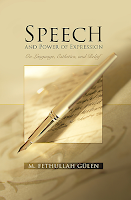Nisa Nur Terzi
Speech and Power of Expression is a book about the art of speech, and it comes from the master of this skill. While Fethullah Gülen is known for his authority as a scholar and an activist in promoting education and dialogue, his power of expression and oratory skills as a prolific writer and poet earn him equal renown and surpass his counterparts.
The book opens with a divine notion, presenting readers with the concept that speech was the first drop of ink that flowed from the pen of Divine Power to give life to non-existence. It was speech that was revealed and displayed the mysterious relation between the Creator and the created. Gülen points out that the Holy Qur'an is a sample of speech, written in such an expressive style like no other divine or worldly expression. "The Qur'an does not address solely the minds, hearts, or souls. It treats human beings in the totality of their emotions, physical or spiritual. Its message is brief and concise, but addresses both the inner world and the outer world of the human at the same time."
Gülen illustrates the journey of speech in such an impressive manner that it is as if he is gently holding the readers' hands and taking them on this journey himself. His words are gentle and comforting, almost like a lullaby. "We have all had our eyes opened to this world with speech and have grown up on the lullabies of speech, and we have headed toward where we are with the magic of speech. Henceforth, we will breathe and live again with speech if we are to live, and we will die with a lack of speech and knowledge if we are to die. Speech is the resuscitating breath for living corpses and the water of life for those who want to live forever."
Obvious to readers familiar with his works, Gülen gives a systematic and thorough overview of language and portrays the power of such a medium. What is most impressive about this book is Gülen's personal use of eloquent language to explain the concept of eloquent language. Gülen shows how beautiful language can be written through his own writing style, word choice, and stylistic techniques. His use of descriptive words, visual imagery, metaphors, and allusions makes Gülen's literary technique in writing this book is as impressive as the content and ideas he expresses.
In Gülen's view, the power of a nation is directly proportional to the power and richness of its language and thought. He argues that the more richly and colorfully a nation can speak, the more they can think. The more they can think, the broader the span of their speech can reach. Gülen seeks to relay information to everyone everywhere, noting that societies which do not think and speak will find that others speak and think on their behalf. He refers to those unfortunate people who cannot put what they think into words as slaves of their own incapabilities.
Gülen speaks of the balance needed to continue the relationship between language and thought. He says one should neither cast everything that is old into oblivion, nor turn his face to the past and close the door to what is new. Instead, he stresses that one must embrace the past with utmost sincerity and at the same time salute the coming days with their new developments and transformations. One should not be sacrificed for the other.
Gülen argues that future architects of thought and masters of language should do everything they can to protect and honor the power of expression, because it has fallen into incapable hands. "They should untie its tongue, so that it can voice our own world of thoughts. Otherwise, it is obvious that we will keep on hearing the cawing of the crows where we expect to hear the singing of the nightingales; we will not be able to be free of the distress of the thorns on the way to roses."
Gülen echoes the great Master Rumi in describing to readers his love for God, one that surpassed the normal bounds of love and became transcendental love. Gülen includes snippets of Rumi's poems to demonstrate the ecstatic divine love that blew Rumi's mind away. "The Burak [horse] of love has taken my mind and my heart, no do not ask me where. I have reached such a realm that there is no moon, not day. I have reached a world where the world is no longer the world."
Gülen's oratory style of writing throughout the book maintains interest and enthusiasm, using colorful expressions and enlivening his writing by inspirational shifts without detracting from his main ideas. Gülen's literary style includes vividness of expression, accuracy of language, beauty of the presentation of his ideas, richness of imagination, the utilization of metaphors and allusions in the most balanced manner, without reaching the point of excess.
Readers need to keep in mind that the book is a translation and that it is not identical to Gülen's original work Beyan. Nevertheless, this translation portrays great effort to reflect the original text as accurately and as accessibly as possible because translating the works of a scholar such as Gülen is incredibly challenging and requires thorough brainwork.
With further essays on literature, beauty, divine love, poetry, women and mercy, this book welcomes readers into the eloquent and articulate realm of knowledge that shines through Gülen's literary style and message. Speech and Power of Expression is ideal for writers, journalists, academics, and most suitable for anyone who enjoys reading the books of Gülen.
Speech and Power of Expression: On Language, Aesthetics, and Belief
M. Fethullah Gülen
Translated by Korkut Altay
9781597842297
Tughra Books, 2010
Published on The Fountain Magazine, Issue 85 (January-February 2012)
 Thursday, August 02, 2012
Thursday, August 02, 2012



 Posted in:
Posted in: 

0 comments:
Post a Comment